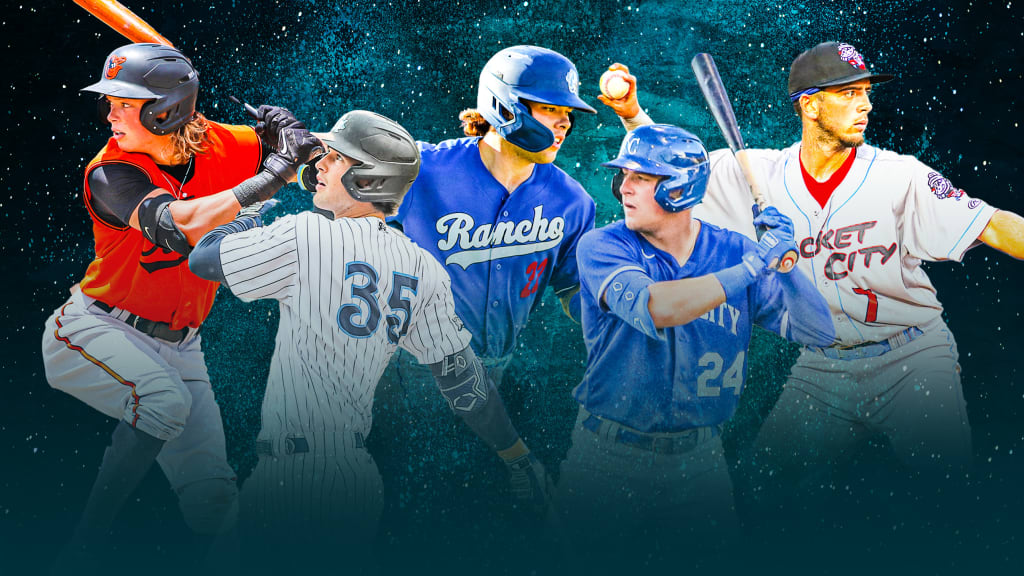
In the grand scheme of development, pro debut performances by draftees don't matter much and often involve small sample sizes after a layoff. To cite one famous example, Chipper Jones posted a .592 OPS in Rookie ball after going No. 1 overall in 1990, fueling incredulity that the Braves could have selected him over Todd Van Poppel.
On the other hand, it's comforting for clubs to see players whom they've just taken get off to good starts. A year ago, we cited 15 draftees who made strong debuts, and several of them built on that momentum in 2022.
Of that group, five are ensconced on our Top 100 Prospects list: first-rounders Colton Cowser (Orioles), Sal Frelick (Brewers) and Harry Ford (Mariners) plus second-rounders James Wood (Padres) and Zack Gelof (Triple-A). Cowser, Frelick and Gelof all ended their first full pro seasons in Triple-A.
Wood is one of five players from last year's best-debut list who already have been used as a trade chip. He became a National as part of the Juan Soto blockbuster, while Braves first-rounder Ryan Cusick went to the Athletics in a package for Matt Olson and Astros fourth-rounder Chayce McDermott moved to the Orioles in a three-team deal for Trey Mancini. The Red Sox acquired Brewers third-rounder Alex Binelas in the Hunter Renfroe trade and added Mariners 12th-rounder Corey Rosier in the Eric Hosmer salary dump by the Padres (who had acquired Rosier in a deal for Adam Frazier).
Two other members of that list who had strong 2022 seasons are Phillies fifth-rounder Griff McGarry and Padres 16th-rounder Alek Jacob. McGarry has continued to harness his quality stuff and is making a push to join the Top 100. Jacob now sports a 2.00 ERA with 106 strikeouts in 76 2/3 innings as a pro and reached Triple-A this year.
Below we present 16 players who impressed in pro ball this summer after signing out of the 2022 Draft. Hitters dominate our list because so few pitchers get much action immediately after turning pro, with only a dozen working as many as 15 innings.
Mason Barnett, RHP, Royals (3rd round, Auburn)
The most dominant drafted pitcher, Barnett faced the minimum 24 batters in eight shutout innings (mostly in Single-A), allowing just one baserunner (via a walk) while striking out 12. His best pitch is a mid-80s slider with depth, and he sets it up with a mid-90s fastball that touches 98 mph.
John Michael Bertrand, LHP, Giants (10th round, Notre Dame)
After leading the Atlantic Coast Conference with a 2.81 ERA, Bertrand matched Barnett for the most scoreless innings (eight) by a draftee while striking out twice as many hitters (eight) as he allowed to reach base (four) in Rookie ball. He's a finesse pitcher who locates his upper-80s fastball well and possesses a solid changeup.
Gavin Cross, OF, Royals (1st round, Virginia Tech)
Cross posted the best numbers of any first-round pick, no surprise considering that he was one of the top college offensive performers available. The No. 9 overall selection batted .312/.437/.633 with eight homers and four steals in 29 games, mostly in Single-A.
Griffin Doersching, 1B, Padres (8th round, Oklahoma State)
Doersching is a one-tool guy but makes the most of it, translating his power into 62 homers in five college seasons at Northern Kentucky and Oklahoma State and into a 2022 Draft-high nine blasts this summer. He batted .245/.370/.541 in 30 games, mostly in Single-A.
Jud Fabian, OF, Orioles (supplemental 2nd round, Florida)
After declining the Red Sox as a second-round pick in 2021, Fabian signed with the Orioles this time around and broke into pro ball by batting .333/.455/.615 with 14 extra-base hits in 22 games while advancing to High-A. He showcased some of the best all-around tools in the 2022 college crop but never hit for average in four college seasons.
Cade Gibson, LHP, Marlins (10th round, Louisiana Tech)
Gibson logged a 0.61 ERA, .157 average and 20 strikeouts in 14 2/3 innings between Rookie ball and Single-A. A sixth-year senior who missed 2019-20 following Tommy John surgery, he throws strikes and gets good action on a low-80s changeup.
Tyler Guilfoil, RHP, Astros (8th round, Kentucky)
Guilfoil topped all drafted pitchers in strikeouts (31 in 17 1/3 innings) and all those who worked at least 10 frames in ERA (0.52) and WHIP (0.69) while dividing his time between Rookie ball and Single-A. He earned All-America honors during the spring at Kentucky after recording a 1.59 ERA with 80 strikeouts in 51 innings, getting a ton of swings and misses on his low-90s fastball because he has a low release point and a lot of induced vertical break.
Jackson Holliday, SS, Orioles (1st round, HS/Oklahoma)
Holliday went No. 1 overall because he had the best combination of hitting ability and tools in the Draft, and the son of seven-time All-Star Matt Holliday lived up to his reputation during his debut. He batted .297/.489/.422 with six extra-bases hits and four steals in 20 games, drew 25 walks versus just 12 strikeouts and reached Single-A.
Spencer Jones, OF, Yankees (1st round, Vanderbilt)
Jones led all first-rounders (minimum 100 plate appearances) in hitting and posted a .344/.425/.538 line with 10 extra-bases hits and 12 steals in 12 tries in 25 games, mostly in Single-A. A quality athlete for a 6-foot-7, 225-pounder, he also adapted well to center field after playing right field at Vanderbilt.
Ben Joyce, RHP, Angels (3rd round, Tennessee)
The Angels sent Joyce straight to Double-A after he signed and he thrived, recording a 2.08 ERA with 20 strikeouts in 13 one-inning outings, fanning the side in each of his final two appearances. He became a sensation this spring while averaging 101 mph and peaking at 105 with his fastball.
Jared McKenzie, OF, Nationals (5th round, Baylor)
After batting .389 in his first two seasons at Baylor, McKenzie slumped in the Cape Cod League last summer and back with the Bears this spring. He snapped out of it in his pro debut, batting .400/.425/.614 with 10 extra-base hits and 11 steals in as many attempts in 17 Single-A games.
Wade Meckler, OF, Giants (8th round, Oregon State)
Meckler broke into pro ball by batting .367/.500/.544 with 12 extra-base hits in 23 games between Rookie-ball and Single-A. His best tool is his well above-average speed, though it has yet to translate into stolen bases or regular time in center field.
Zach Neto, SS, Angels (1st round, Campbell)
The first-ever first-round pick from Campbell, where he won consecutive Big South Conference player of the year awards and set a school record with a career .403 average, Neto kept raking despite aggressive assignments to High-A and Double-A. He led all draftees with 44 hits in 37 games while batting .299/.377/.476 with 15 extra-base knocks.
Dalton Rushing, C, Dodgers (2nd round, Louisville)
Rushing had the best debut among all draftees, leading them in all three slash categories at .404/.522/.740 as well as with 77 total bases in 30 games, mostly in Single-A. The Dodgers' top pick (40th overall) in July, he had one of the best combinations of power and patience in the college class.
Cameron Wagoner, RHP, Brewers (11th round, Eastern Michigan)
Academically ineligible during the spring, Wagoner returned to the mound in the Cape Cod League and ran his fastball up to 97 mph and his slider up to 87. He paced all draftees in wins (three), innings (19 2/3) and K/BB ratio (24/2) while compiling a 1.83 ERA between Rookie ball and Single-A.
Cole Young, SS, Mariners (1st round, HS/Pennsylvania)
One of the most advanced prep hitters in the Draft, Young went 21st overall before batting .367/.423/.517 with four extra-base hits and four steals in 17 games between Rookie ball and Single-A. He went 12-for-25 (.480) in his final six contests, including his first two homers as a pro.
